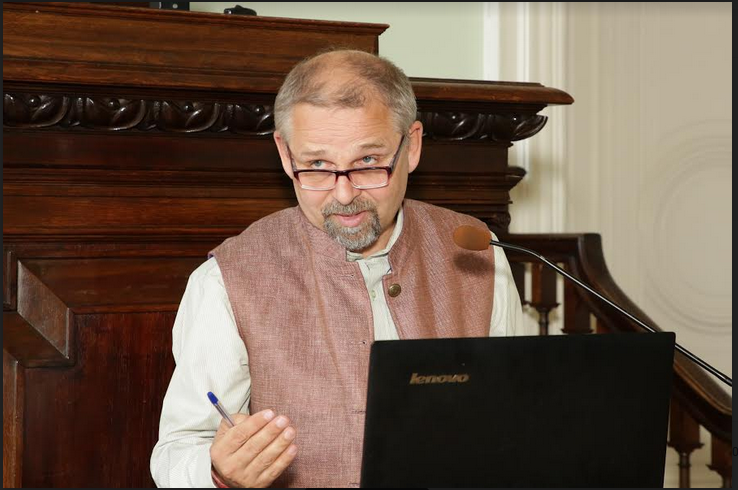
Professor of medicine and Wikimedian Valdis Pīrāgs (User:Pirags) shares with us his work in the Latvian Wikipedia community over the last thirteen years and his hopes for the future.
A student of physics and math, and later medicine, Valdis Pīrāgs is currently head of the clinic at the main teaching hospital in Latvia and a professor of medicine. His area of research is hormonal regulation of life processes, as well as complex interactions between the external environment, our genes, the body and mind. While genuinely impressive I was more interested in talking to Valdis about his work as a Wikimedian.
The Latvian Wikipedia is the 66th-largest Wikipedia and the second-largest Wikipedia in a Baltic language, with 104,000 articles. With over a hundred thousand edits under his name, Pīrāgs is one of the pioneering contributors to the project – and knowledge around Latvia and its history. Alone, he has created nearly 5,000 new articles since joining the movement in 2007.
Pīrāgs started making episodic edits in 2006 and decided to register an account in December of 2007. During conversations with a good colleague about English Wikipedia articles on noteworthy people, his colleague routinely asked “Did you know that he/she is connected to Latvia?” He then realized that the Latvian Wikipedia lacked articles on many exciting topics. Married with four children, Pīrāgs shares that initially his wife was rather disappointed with his editing. “Instead of talking to her at home I was writing articles in Wikipedia! Almost 15 years later she realised that it’s part of my life. Sometimes she is even giving me suggestions to write about the actual events.” Pīrāgs’ kids however are using Wikipedia to write essays for school homework and are not at all angry for their father’s involvement in the movement.
Pīrāgs’ first contributions were around the medieval history of Latvia. He then began to focus on writing biographies of famous Latvians and people who had any connection to Latvia.
While Pīrāgs’ has mostly edited the Latvian WIkipedia, he also speaks Russian and German and lived in Germany for a while. He’s a self-described “cosmopolitan who fluently speaks four languages including English.” This shines through his edits. He’s also contributed to English Wikipedia – mainly on articles connected with the history and people from Latvia – and occasional edits to more than 20 language Wikipedias. Again mostly related to Latvia, its history and people.
The makeup of the Latvian Wikipedia is similar to many of the medium-sized projects. Currently there are 13 administrators and 285 active contributors on the Latvian Wikipedia, of which between 12 and 20 are active every month. Some Latvian Wikimedians regularly participate in regional and global Wikimedia events. And, like most projects, there are sometimes tough discussions between deletionists and inclusionists.
Pīrāgs has met some of his fellow Latvian Wikipedians on different occasions. He has participated in a few offline meetings with senior Latvian Wikipedians to discuss the Latvian Wikipedia Marathon project: the. digitalization and transfer of articles from the 21 volumes of the Latvian Conversation Dictionary (Latviešu Konversācijas vārdnīca) to the Latvian language Wikipedia. Pīrāgs has also participated in several editathons like CEE Spring. Of working with fellow Latvian editors he said, “Sometimes we have tough discussions on different topics online which usually lead to constructive changes, I would say that it’s a typical way how Latvians are solving problems.”
As for outside the Wikimedia movement in Latvia, Pīrāgs says that generally the Latvian community is rather sceptical towards Wikipedia. “Most school teachers are critical against using such unreliable sources. However, journalists and bloggers are frequently using Wikipedia with and without quoting. As a result several free and “more reliable” encyclopaedias emerged, for example the Latvian National Encyclopaedia was launched in 2015 and currently has more than 1973 articles. The oldest Latvian online encyclopaedia is historia.lv launched in 2001.”
When asked about how to attract and retain editors for the Latvian Wikipedia, Pīrāgs mentioned the Latvian Wikipedia Marathon project which took place from 2015 to 2018 as an example of a successful joint effort of Latvian Wikipedians to expand the Latvian language Wikipedia. The goal was to expand Wikipedia to 100,000 articles to commemorate the 100th Anniversary of the Latvian Republic on 18 November 2018. The number of articles increased from 59,000 in March 2015 to 90,000 at the end of 2018 and reached 100,000 articles in January 2020.
Pīrāgs also suggests a more polite and inviting attitude towards new users. To retain old ones we need more focused projects in their respective fields of interest. However, the main task should be to increase the public visibility and reliability of the Latvian language Wikipedia.
For future ambitions of the project, Pīrāgs is convinced that the Latvian language Wikipedia will serve as the main free and reliable encyclopedic information source for the Latvian people. It will be acknowledged by Latvian teachers and academics, which currently is not the case. More and more competent people will become Wikipedians and contribute with their knowledge and skill to expand the number of high quality articles.
For this ambition to be successful, Pīrāgs says there needs to be more cooperation across projects in the realm of translation. Latvian language Wikipedia already has a huge number of good articles on Latvian history and culture.
His own personal future wiki ambition is to steadily transfer all reliable information from the Latvian books and internet sources to Wikipedia. This also includes articles and books written in Latin and German, which were used as official languages in Latvia between the 13th and 19th centuries.
“We are doing probably the greatest voluntary mission in the modern information world. I wish that our work will become more prestigious and recognizable not only among all internet users but also experts.”
– Valdis Pīrāgs

Can you help us translate this article?
In order for this article to reach as many people as possible we would like your help. Can you translate this article to get the message out?
Start translation